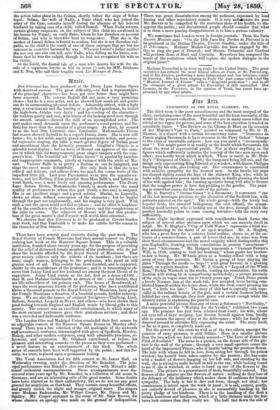There have been several good concerts during the past week.
The Royal Society of Female Musicians had their annual concert on Friday evening last week at the Hanover Square Rooms. This is a valuable institution, founded about twenty years ago for the purpose of providing for the relief of distressed female members of the profession who do not share the benefits afforded by the Royal Society of Musicians. That great society relieves only the widows of its members ; but there are many single women, belonging to the profession, who stand in still greater need of aid. This society has been founded, and is supported, chiefly by the munificence of the profession ; and it is interesting to ob- serve that Jenny Lind and her husband are among the most liberal of its supporters. Jenny Lind stands on the list, first as a donor of 1501.; then M. and Madame Goldsehmidt as donors of 301.; and further, they are life-subscribers of ten guineas each. The house of Broadwood, ways the most generous friends of the profession, who have contributed above a thousand pounds to the Royal Society of Musicians, have given the Female Musicians a donation of a hundred pounds, besides subscrip- tions. We see also the names of eminent foreigners—Thalberg, Liszt, Belletti, Benedict, Leopold de Meyer, and others—who have shown their good feeling towards England and English music by liberal gifts to this society. The concert was an excellent entertainment, to which many of the most eminent performers gave their gratuitous services ; and there was a crowded and fashionable audience.
The London Glee and Madrigal Union concluded their first season by an a4irable concert at the Hanover Square Rooms on Monday after- nooqi There was a fine selection of the old madrigals of the sixteenth awl seventeenih centuries, intermingled with glees of Spofforth, Horsley, -Bishop, and other modern composers, sung with admirable precision, re- finement, and expression. Mr. Oliphant contributed, as before, his pleasant and interesting remarks en the pieces as they were performed— a novel feature in an entertainmwet„ ef this kind. The whole series of concerts have been well supported by the public; and this So- ciety, we trust, is placed upon a permanent footing.
The Vocal Association had its fifth concert at St. James Hall, on Wednesday evening, under the direction of Mr. Benedict. The prin- cipal performance was Handers aleis and Galatea, with Mozart's addi- tional orchestral accompaniments. These accompaniments were dis- covered some years ago by Mr. Benedict, in a collection of old music in Germany, and are an interesting relic of the great master. Some doubts have been started as to their authenticity, but we do not see any good ground for scepticism on that head. They contain many beautiful effects, and greatly enrich the slight and meagre original score. The singers were Madame Enderssohn, Mr. Wilbye Cooper, Mr. Dyson and Mr. Santky. 'lir: Cooper appeared in the room of Mr. Sims Reeves, for whose absence an apology was made on the ground of indisposition.
There was great dissatisfaction among the audience, expressed by loud hissing and other reprobatory sounds. It is very unfoatunate for poor Mr. Reeves to be compelled by the uncertain state of his health, to dis- appoint the public ; and discontented people should consider that what is to them a mere passing disappointment is to him a serious calamity.
We sometimes find London news in foreign journals. Thus, the Paris Gazette Musicale says "On the 15th June the Pardon de Ploirtnel is to be produced at the Italian Theatre, Covent Garden,' under the title of Ii Pelerinagio. Madame Miolan-Carvallio has been engaged by Mr. Gye to sing the part of Dinorah ; and Messrs. Debassini and Gardoni will perform those of Heel and Corentin. Meyerbeer has composed the 111118/C of the recitatives which will replace the spoken dialogue in the original piece."


























 Previous page
Previous page